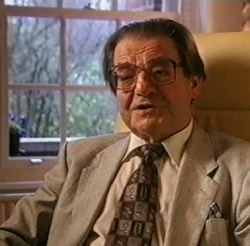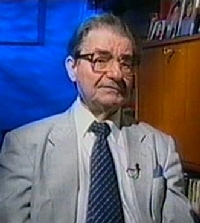Meet The Producer
Feature from 2012

John Ammonds

John during an interview
Sid and Dick were probably the first of many who, with their great scripts, helped to bring Eric and Ern from the radio to the television screen with relative success. Eddie Braben followed them and launched the pair into the golden age of television, aided by the great and sadly missed Sir Bill Cotton.
In front of the camera, recognition must go to Ann Hamilton, who in the BBC years played the female roles to perfection and understood how Morecambe and Wise worked. But it is to another who we should look for a more involved role from script to studio, from jokes to movement, and even that iconic dance; it is of course, John Ammonds.
John was with Eric and Ernie from the early days, producing their first real successful radio show, Your Only Young Once, or YOYO for short. He got to know them, knew how to get the best from them and how to help them using what technology he had at his disposal.
John’s career in the broadcasting business began with a letter to the BBC in 1941. Unbeknown to his parents, he was bored with general wash of subjects taught in schools and, without knowing anything at all about electronics or broadcasting, made enquiries about possible vacancies for engineers.
He had, as most children did in those days, messed about with little electronic kits, building small transistor radios in his shed, but this hardly counted as having a solid grounding in the subject.
The BBC at the time were looking for what they called sound effect operators, and luckily replied suggesting he might be interested. They sent him the forms which he quickly completed and returned, excited at the prospect of working for the BBC. Shortly after he was called for interview and thus began his long and successful career in broadcasting at the ripe old age of sixteen.
His initial job was to create, play or modify existing pre-recorded sounds to be used in various radio broadcasts. This could mean making sounds into a microphone, banging a stick on something or playing any number of numerous 78 vinyl recordings, all stacked up forming the basis of the BBC sound effects library.
As the war caused mass destruction in London, the BBC suggested he move to the new variety department in Bristol. John accepted and ended up staying with the department for the next 30 years. The location changed again as wartime bombing meant moving yet again, this time to Bangor.
In the early days he worked on a lot of comedy shows, adding the background spot effects just at the right time to get the laugh. This early foray into comedy taught him one of the most important lessons, that of timing. An effect had to be perfect to fit in with the script and the actors to have just the right kind of effect.
As war marched on, he joined the army and eventually ended up in Army broadcasting in Hamburg. Two years later and he was offered a job at the BBC in Light Entertainment and whilst there spotted a job on the notice board for a position in Manchester. The job was that of producer, a large step up from twiddling knobs and playing with sound. He applied and was successful.
Working on shows like Call Boy with Jimmy Clithero, and later The Clithero Kid, he was slowly learning the art. When a new comedy double act arrived, looking for their first series on radio, John was appointed producer. He was already aware of them through various variety theatres but no one knew how long they would work together or what fame they would find. The act was of course, Morecambe and Wise.
Still working solely on radio, John frequently flirted with television, producing small shows when he was allowed, building his skills for the right moment. That moment came when a full time television producers job came up, and with his successful catalogue of work, he was given the job.
One of his biggest successes during this period was getting a young performer into the lime light and making him a huge star. Harry Worth owed his career to John and openly admits it. Together they did eight series, only stopping due to a move back to London which meant Harry had to travel more then he liked.
John moved on to other successful shows working with Val Doonican while at the same time his old radio friends were making big waves on ATV with Two Of A Kind.
It was during a meeting with his boss Bill Cotton at the BBC bar that he learnt of the duos switch to the BBC. Bill asked him if he would like to produce for them; what a silly question! John jumped at the chance to work with his mates again, knowing how he could make the boys bigger and better.
Working in television, especially comedy, is a challenge for a producer. They were responsible for almost every aspect of the production, unlike today where you have an army of people all doing small bits. John had to make sure the cameras were right, correct position, height, lens and movement path. Not only that but ensure the sound was right, deal with props, script, scenery and lighting.
It was a hard task but a very enjoyable one and everything was going well until Eric suffered his first heart attack. John knew he would bounce back, but was un-prepared for their writers, Sid and Dick, to jump ship and head back to ATV.
Eddie Braben was brought in and this somehow fully completed the team. Initial fears were quickly thrown out as together they forged something absolutely spectacular. They all knew how to get the best out of each other, and knew exactly how to do their own part to fully compliment the others.
John knew how to use the cameras in a way that gave the intimacy required to show Eric and Ernie at their best, delivering comedy gold written by Eddie. Reaction shots, fitting scenic shots into the mix to ensure the joke got full impact, suggesting ways of delivery that best suited the camera and producing a paced show that always delivered.
The show was at its height in 1974 when John made the difficult decision to leave. His wife was ill and the strain was beginning to tell. He wanted to spend more time at home as a hefty 13 show a year schedule meant that was impossibly difficult.
He didn’t leave television fully, still doing less hectic work with Mike Yarwood and Dick Emery, but the most important thing was he could now devote more time to his private life.
During the last years with Morecambe and Wise, he had worked closely with a man who had a flare for the big dance numbers; in today’s terms he would be called a choreographer. Ernest Maxim had worked side by side with John for many years and knew how things worked, and so handing over producer responsibilities was made easier.
This wasn’t the end of his relationship with Eric and Ernie though, and he was back with them again in 1979, when they moved to Thames. Eric had requested John be the producer, and with the shows being shorter due to adverts, John left the BBC after working there for over thirty years. He wasn’t fully happy with how the reduced time and commercial interruptions broke up the flow, but he was back with his friends once more.
John stayed with them until 1983, leaving only to care for his wife. He still did smaller projects, working on the odd Max Bygraves and Mike Yarwood shows, but it was rapidly getting too hard to balance his life. He always loved working with Morecambe and Wise and is extremely proud of what they created together.
In 1975 he was finally recognised for his work when he was given an MBE.
© morecambeandwise.com 2012